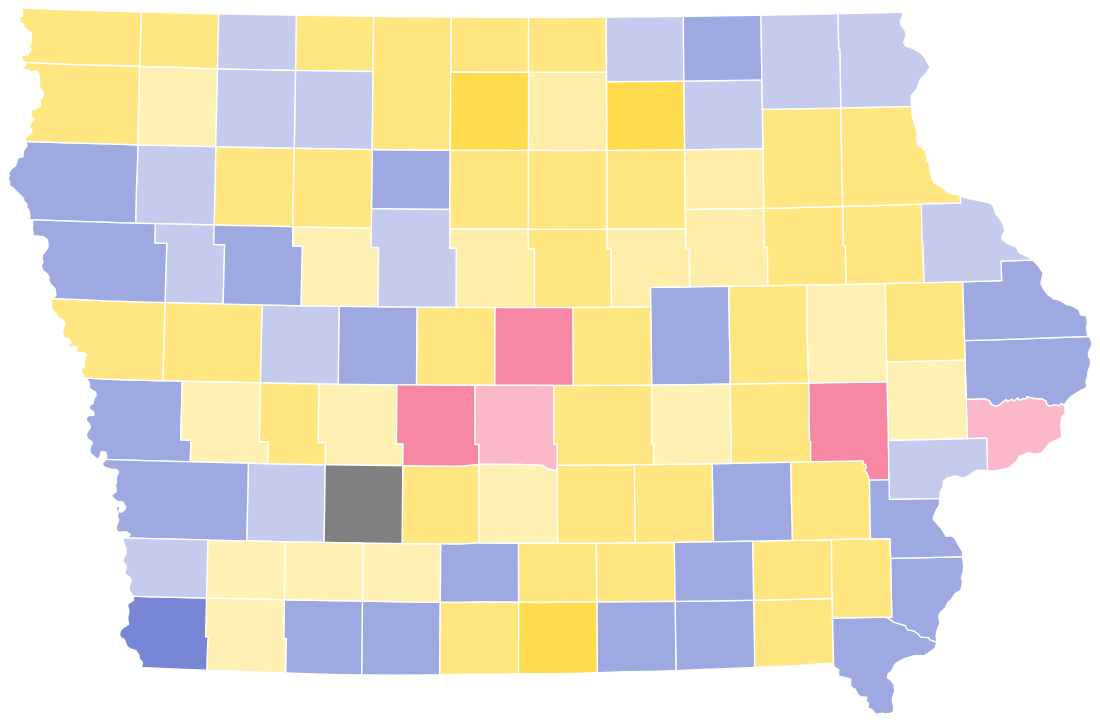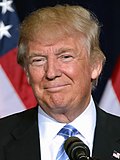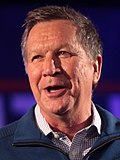Top Qs
Timeline
Chat
Perspective
2016 Iowa Republican presidential caucuses
From Wikipedia, the free encyclopedia
Remove ads
The 2016 Iowa Republican presidential caucuses took place on February 1 in the U.S. state of Iowa, traditionally marking the Republican Party's first nominating contest in their series of presidential primaries ahead of the 2016 presidential election.
The Democratic Party held its own Iowa caucuses on the same day.
Ted Cruz was able to defeat Donald Trump in the Iowa Caucus by winning over Evangelical caucus-goers;[1] Cruz won 51,666 caucus votes or 27.6%, giving him a net gain of one delegate over Trump. Cruz visited all 99 counties of Iowa and held small events.[2] Cruz outperformed his polling average, which predicted a narrow Trump victory in the caucus.
Following poor performances in the caucuses, Rand Paul,[3] Mike Huckabee[4] and Rick Santorum[5] suspended their campaigns.
Remove ads
Procedure
According to the Republican Party of Iowa's bylaws, if more than one candidate is nominated at the Republican National Convention, all of Iowa's delegates are bound to vote "proportionally in accordance with the outcome of the Iowa Caucuses" on the first ballot, even if the candidate has withdrawn from the race.[6] The ballot is a blank piece of paper, and the candidates that voters may vote for in the non-binding preference poll included the following:
Caucus Operations
The caucuses began at 7:00 PM local time across 1,681 precincts statewide. After the selection of caucus chairs and secretaries, campaign representatives made speeches supporting their candidates before voters cast their preferences on paper ballots. The 2016 Republican caucuses set a new turnout record with 186,932 participants, significantly higher than the 121,503 who participated in 2012.[7]
Remove ads
Campaign
The Iowa caucuses required extensive ground organization and retail politics from the candidates. Ted Cruz's campaign pursued a traditional grassroots approach, completing the "Full Grassley" by visiting all 99 counties in Iowa while building relationships with evangelical and conservative leaders.[8] His campaign utilized sophisticated data analytics and microtargeting to identify and turn out likely supporters.
Donald Trump opted for a less conventional strategy, focusing on large rallies and earned media coverage that drew thousands of attendees across the state. However, questions persisted about whether his unorthodox approach could successfully convert rally attendance into caucus participation from first-time voters.[9]
Marco Rubio positioned himself as an electable conservative alternative, particularly appealing to suburban voters and party regulars. His campaign emphasized his youth and vision for a "New American Century," gaining momentum in the final weeks before the caucuses.[10]
Remove ads
Forums and debates
November 20, 2015 – Des Moines, Iowa The Presidential Family Forum was held in the Community Choice Credit Union Convention Center in Des Moines, Iowa. Ben Carson, Ted Cruz, Carly Fiorina, Mike Huckabee, Rand Paul, Marco Rubio, and Rick Santorum attended the forum hosted by evangelical Christian advocacy group The Family Leader. It was hosted by politician and political activist Bob Vander Plaats and moderated by political consultant and pollster Frank Luntz.[11] Protesters interrupted the beginning of the event and were removed by police.[12]
January 28, 2016 – Des Moines, Iowa The seventh debate was the second debate to air on Fox News. As in Fox's first debate, the moderators were Bret Baier, Megyn Kelly, and Chris Wallace.[13] This was the last debate before actual voting began with the Iowa caucuses on February 1, 2016.[14][15] Due to personality conflicts with Fox News, Donald Trump opted out of the debate.[16]
Endorsements
Summarize
Perspective
Cruz secured several influential endorsements that proved crucial to his victory, including Congressman Steve King, who represented Iowa's 4th congressional district, and Bob Vander Plaats, president of The Family Leader, a prominent evangelical organization.[17][18]
Trump notably received limited support from Iowa Republican officials, though he led most pre-caucus polls. Meanwhile, Rubio gained important momentum when he received the endorsement of the Des Moines Register and other newspapers in the closing weeks of the campaign.[19]
Jeb Bush
Former executive branch officials
U.S. Representatives
- Greg Ganske, IA-04 (1995–2003)[21]
State Senators
- Charles Schneider, state senator from the District 22 (2013–present)[22]
State Representatives
- Ron Jorgensen, state representative from the District 6 (2011–present)[23]
- Greg Forristall, state representative from the District 22 (2007–present)[24]
- Zach Nunn, state representative from the District 30 (2015–present)[25]
- Renee Schulte, Former state representative from the District 37 (2008–2013)[26]
- Robert Bacon, state representative from the District 48 (2013–Present)[27]
- Ken Rizer, state representative from the District 68 (2015–present)[28]
- Dave Heaton, state representative from the District 91 (1995–Present)[29]
- Linda Miller, state representative from the District 94 (2007–Present)[30]
Ben Carson
State Representatives
- Rob Taylor, state representative from the District 44 (2013–present)[31]
Chris Christie
State Representatives
- Jake Highfill, state representative from the District 39 (2013–present)[32]
- Chip Baltimore, state representative from the District 47 (2011–present)[33]
- Dave Deyoe, state representative from the District 51 (2007–present)[34]
- Kraig Paulsen, state representative from the District 67 (2003–present)[35]
- Gary Carlson, state representative from the District 91 (2015–present)[36]
Ted Cruz
U.S. Representatives
- Steve King, IA-04 (2003–Present)[37]
State Senators
- Randy Feenstra, state senator from the 2nd district (2009–Present)[38]
- Bill Anderson, state senator from the 3rd district (2011–Present)[39]
- Dennis Guth, state senator from the 4th district (2013-Present)[40]
- Jason Schultz, state senator from the 9th district (2015–Present)[41]
- Jake Chapman, state senator from the 10th district (2013–Present)[42]
- Jerry Behn, state senator from the 24th district (1997–Present)[43]
State Representatives
- Terry Baxter, state representative from the District 8 (2015–Present)[44]
- Steven Holt, state representative from the District 12 (2015–Present)[45]
- Ralph Watts, state representative from the District 19 (2003–Present)[46]
- Greg Heartsill, state representative from the District 28 (2013–Present)[47]
- Sandy Salmon, state representative from the District 63 (2013–Present)[48]
- Larry Sheets, state representative from the District 80 (2013–Present)[49]
Notable individuals
- Bob Vander Plaats, political activist and president and CEO of The Family Leader[50]
Carly Fiorina
State Senators
- David Johnson, state senator from the 1st district (2003-Present)[51]
State Representatives
- Mike May, state representative from the District 6 (2005–2011)[52]
- Mike Sexton, state representative from the District 7 (2015–present)[53]
- Clel Baudler, state representative from the District 20 (1999–present)[54]
- Josh Byrnes, state representative from the District 51 (2011–present)[55]
- Steven Olson, state representative from the District 83 (2003–present)[56]
- Ross Paustian, state representative from the District 92 (2015–present)[57]
John Kasich
State Representatives
- Mary Ann Hanusa, state representative from the District 16 (2011–present)[58]
- David Sieck, state representative from the District 86 (2015–present)[59]
Mike Huckabee
State Representatives
- Tedd Gassman, state representative from the District 7 (2013–present)[60]
Marco Rubio
State Senators
- Rick Bertrand, state senator from the 7th district (2011–present)[61]
- Tom Shipley, state senator from the 11th district(2015-Present)[62]
- Jack Whitver, state senator from the 19th district (2011–present)[63]
- Dan Zumbach, state senator from the 48th district (2013–present)[64]
State Representatives
- Megan Jones, state representative from the District 6 (2013–Present)[65]
- John Wills, state representative from the District 10 (2015–Present)[66]
- Brian Best, state representative from the District 11 (2015–Present)[67]
- Bobby Kaufmann, state representative from the District 82 (2013–present)[68]
Newspapers
Rick Santorum
State Representatives
- Dean Fisher, state representative from the District 53 (2013-Present)[71]
- Walt Rogers, state representative from the District 60 (2011-Present)[72]
Donald Trump
State Senators
- Brad Zaun, state senator from the 20th district (2005-Present)[73]
Withdrawn candidates
Lindsey Graham (Withdrawn)
State Senators
- Tim Kapucian, state senator from the 38th district (2009-Present)[74]
Bobby Jindal (Withdrawn)
State Representatives
- Matt Windschitl, state representative from the District 17 (2007–present)[75]
Rick Perry (Withdrawn)
State Representatives
- Dawn Pettengill, state representative from the District 75 (2005-Present)[76]
Scott Walker (Withdrawn)
State Senators
- Mark Costello, state senator from the 8th district (2015-Present)[77]
- Jason Schultz, state senator from the 9th district (2015-Present)[78]
- Julian Garrett, state senator from the 11th district (2013-Present)[79]
- Amy Sinclair, state senator from the 14th district (2013-Present)[80]
State Representatives
- John Landon, state representative from the District 37 (2013-Present)[81]
Remove ads
Polling
Summarize
Perspective
Aggregate polls
Polls in 2015
Polls in 2014
Polls in 2013-2012
Remove ads
Results
Results by County

Cruz—40-50%
Cruz—30-40%
Cruz—20-30%
Tied between Cruz and Trump
Trump—20-30%
Trump—30-40%
Trump—40-50%
Rubio—20-30%
Rubio—30-40%
Remove ads
Aftermath and Controversy
The caucus results led to immediate controversy when Ben Carson accused Cruz's campaign of employing dishonest tactics, specifically claiming that Cruz supporters falsely told caucus-goers that Carson had dropped out to convince them to switch their votes.[174]
Trump subsequently accused Cruz of "stealing" the Iowa caucuses through fraud, taking to social media to demand that Cruz be disqualified and the election results invalidated.[175] These accusations foreshadowed continued tensions between Cruz and Trump as the primary campaign progressed. According to an interview of Trump with Greta Van Susteren of On the Record, he said, “Everything about it was disgraceful. It was a fraud as far as I was concerned.”[176]
The results also had an immediate impact on the Republican field, as Rand Paul, Mike Huckabee, and Rick Santorum suspended their campaigns in the days following the caucuses.[177][178]
Remove ads
Geographic and Demographic Analysis
Summarize
Perspective
Exit polling revealed Cruz's victory was built on strong support from evangelical voters, who comprised 62% of caucus participants. He won 33% of evangelical voters, while also performing strongly in rural counties and areas with high evangelical populations.[179]
Trump's support was notably stronger in eastern Iowa and working-class areas, particularly along the Mississippi River. He performed best among first-time caucus participants and voters without college degrees. Rubio showed particular strength in suburban areas around Des Moines, Cedar Rapids, and other population centers, winning 28% of college graduates and performing well among late-deciding voters.
Remove ads
See also
Notes
- Consists of the vote totals for all candidates that did not receive delegates, which are: Chris Christie, Rick Santorum, Jim Gilmore, and any other write-ins or candidates.
References
External links
Wikiwand - on
Seamless Wikipedia browsing. On steroids.
Remove ads










